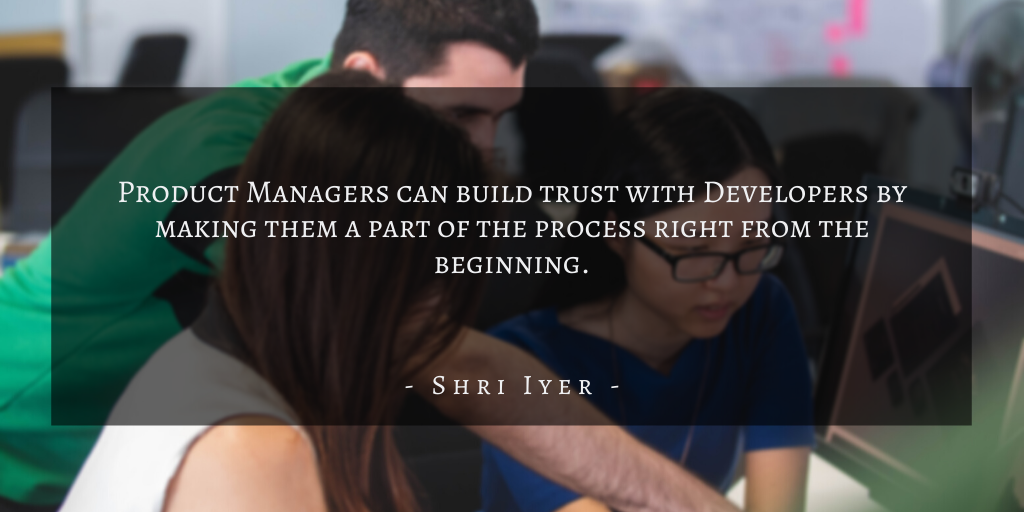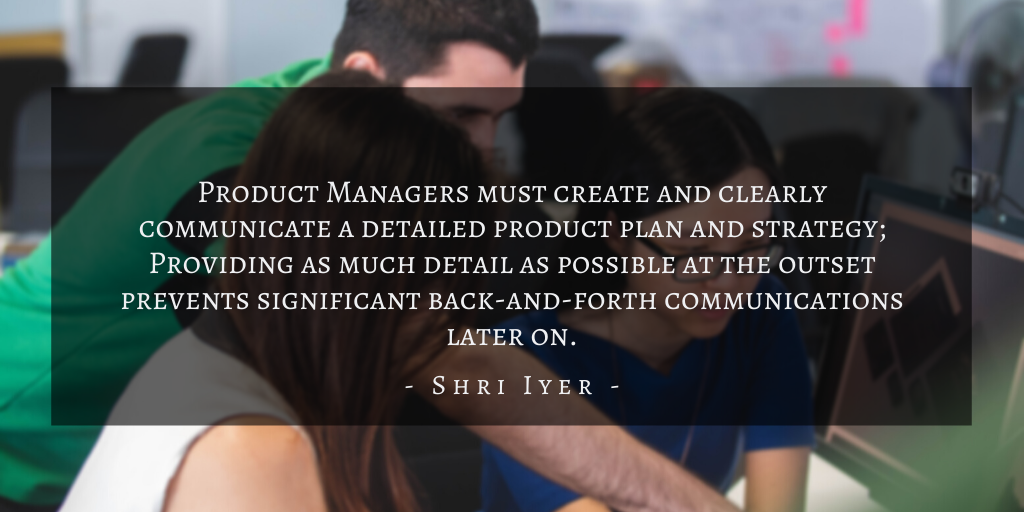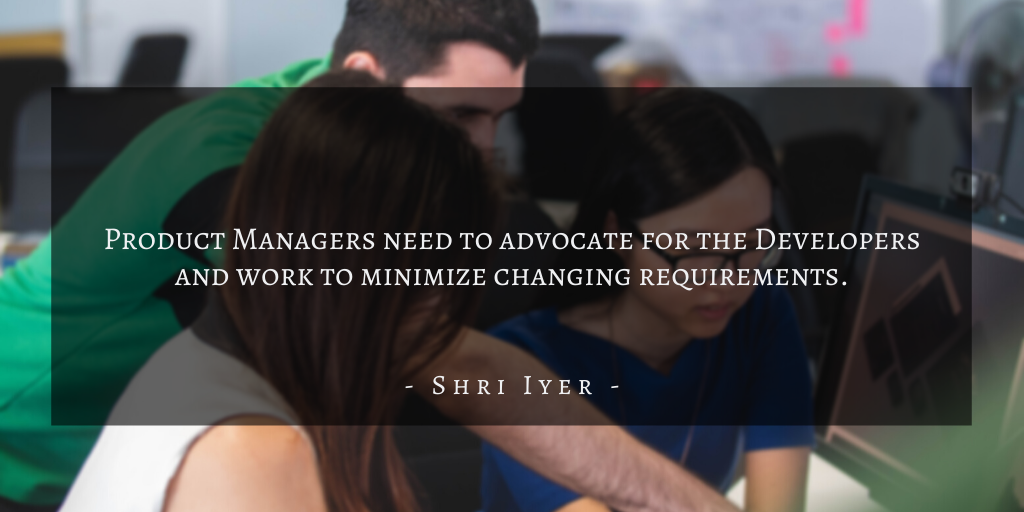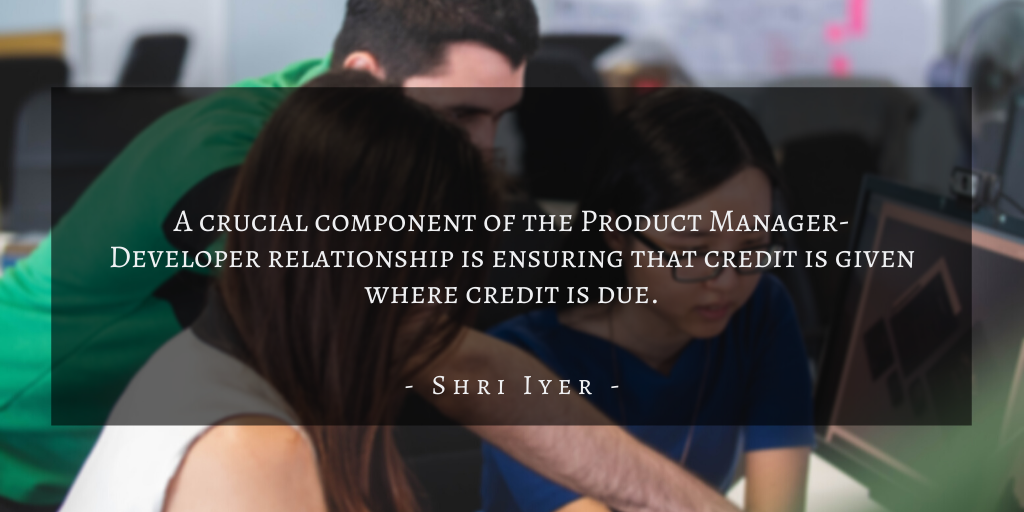Collaboration among the various departments in a company is essential to creating a viable quality product. The Product Manager’s role is to facilitate this cross-department collaboration and balance sometimes conflicting ideas, concerns, and feedback. In Product Management, the relationship between Product Managers and Developers is at the crux of creating effective and sustainable value for customers. Central to this relationship is trust, clear and specific communication, boundaries and a mutual understanding of priorities. Product Managers must invest in this relationship if they are to succeed.
Too often, product teams wait to involve Developers until they have a set product direction. However,

With extensive projects, Product Managers should consider including Developers in an all-department kickoff meeting to ensure everyone is on the same page, knows the plan, and how it will be executed.
Including Developers in the beginning stages of product development when defining a feature’s scope can provide them with a clearer picture of its complexity and the difficulty of implementation. Developers may be able to provide insight into how to solve the problem in a simpler way. Giving Developers this window into the specifics and the “whys” of the product can lead to more accurate time estimates and greater buy-in from the Developers. Giving the Dev team a chance to contribute early and often throughout the process provides transparency and can increase motivation.
Another way for PMs to establish credibility with Developers is by doing their homework ahead of time. Knowing what data is relevant and bringing that data to the table can reassure Developers of the decisions that have been made and allow them to feel confident in devoting their time and energy to the product. Everyone wants to know that the job they are doing is contributing to the overall success of the product. When Product Managers make decisions solely on hunches or without data to back up their decisions, it can lead to Developers having to undo the work they’ve already begun. Such decisions hurt productivity and the Product Manager’s credibility.
Beyond establishing trust and credibility with Developers in the beginning stages,

It also lowers the chances of having to redo what’s already been done. The plan should include the reasoning behind the prioritization of features, styling, and workflow. It’s also critical to indicate which parts of the product plan have been ironed out and what pieces may still be in flux.
Feature prioritization needs to be more specific than a list of features merely labeled high, medium, and low, or worse yet, everything marked “urgent.” Product Managers will need to evaluate each feature based on:
- importance in the overall product vision
- number of potential users
- development effort required
- Cost of omitting or not finishing the feature
- Likelihood the feature will be omitted or unfinished
The prioritization of features is a complex exercise and Product Managers need to factor in such criteria to ensure Developers have a clearly prioritized list.

Understandably, there’s not much that’s more frustrating than trying to hit a constantly moving target. And while priorities may evolve as a product is developed, Product Managers must be proactive and promptly communicate those changes. It’s also a good idea to establish periodic check-ins throughout the development process to re-sync the team on necessary changes and their effect on the scope of the project. Throughout product development, it’s also essential for Product Managers to avoid committing to dates, estimates of effort, or communicate project schedules to stakeholders without checking in with the Developers. This is the Product Management equivalent of inviting someone over for dinner when your significant other is the one doing the cooking and not telling them until an hour before the guest is set to arrive. While Product Managers need to earn the trust of Developers, it’s important to remember that trust goes both ways. Checking in with Developers before committing to timelines demonstrates that Product Managers value their contributions and trust them to use their professional judgment when providing estimates.
When it comes to demonstrating trust and respect for Developers, it’s critical that PMs allow them the flexibility to do their jobs. Attempting to micromanage or dictate how problems should be solved doesn’t allow Developers a chance to do what they do best – find the most effective and efficient way to solve the problem. If a Product Manager has succinctly communicated the problem to be solved and the reasons for decisions that have been made, they should then leave it to the Developers to figure out the “how.”
While Product Managers don’t need to be experts in software development, successful Product Managers know enough to have intelligent technical conversations and be familiar with the tools Developers use. Or at the very least, realize what they don’t know and make an effort to learn. By taking the time to learn some of the technical language surrounding product development and knowing when to step out of the way, Product Managers can demonstrate respect for software development’s creative and flexible nature.

Product Managers can damage relationships with Developers by failing to share credit for success. One tactic Product Managers can employ to share credit is to make sure all internal stakeholders connect the outcomes they see with the Developers that have created the product. Encourage other departments to acknowledge and express appreciation for the Dev Team’s successes and express your own pride and appreciation in their achievements – not just for major deliverables, but celebrate the team’s smaller victories as well. Most people appreciate the opportunity to have their successes acknowledged.
Mutual respect and a positive relationship between Product Managers and Developers result in better products going to market and better served consumers. Including Developers early in product ideation and keeping the lines of communication open allows Product Managers to bring collaboration across departments to a whole new level that benefits all stakeholders.

